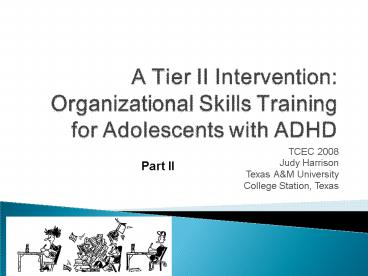A Tier II Intervention: Organizational Skills Training for Adolescents with ADHD - PowerPoint PPT Presentation
1 / 16
Title:
A Tier II Intervention: Organizational Skills Training for Adolescents with ADHD
Description:
... for Attention Deficit Hyperactivity Disorder: Where to ... Efficacy of a school-based treatment program for middle school youth with ADHD.: Pilot data. ... – PowerPoint PPT presentation
Number of Views:508
Avg rating:3.0/5.0
Title: A Tier II Intervention: Organizational Skills Training for Adolescents with ADHD
1
A Tier II InterventionOrganizational Skills
Training for Adolescents with ADHD
- TCEC 2008
- Judy Harrison
- Texas AM University
- College Station, Texas
Part II
2
Ongoing assessment and progress monitoring
- Get Organized Sheet provides daily measurement of
organizational criteria - Treatment Plan-Core Measures Document is used to
monitor progress on each organization criteria - Classroom Preparation Checklist (in handout)
provides daily measure of impact of
organizational skills training on student
classroom preparation
3
Procedural Steps Baseline
4
Get Organized Sheet Binder
5
Get Organized Sheet Binder
6
Get Organized Sheet Bookbag
7
Get Organized Sheet Locker
8
Procedural Steps Intervention First Session
9
Procedural Steps Intervention Subsequent
Sessions (contd)
10
Organizational Skills Sessions
11
Optional activities
- Increase frequency and intensity of reinforcers
- Change criteria for reinforcers
- Change type of reinforcer
- Include parent in completing the Get Organized
Sheet
12
Fidelity of Implementation Checklist
- Documentation that interventionist completed
training with fidelity - Completed by interventionist and other for
inter-rater agreement 20 of the intervention - Copy in handout
13
Proposed Study
- Independent Variable
- Organizational Skills Training
- Dependent Variable
- Classroom Preparation
- Math performance (percent of homework assignments
completed and submitted) - Math grades
- Participants
- 6th - 8th grade students with prior diagnosis of
ADHD - IQ 90 or above
- Without math disability
- 8 week intervention
- Interventionist works with 5 students and math
teacher(s) collect data on 10 students (5
experimental and 5 control group)
14
Interested in participating?
- Contact Judy Harrison, Doctoral Candidate Texas
AM University, College Station - judylpc_at_tamu.edu
- jharrison_at_lumberton.k12.tx.us
- (409) 651-1675
15
References
- American Psychiatric Association. (2000).
Diagnostic and statistical manual of mental
disorders Text revisions (4th ed., Revised).
Washington DC Author. - Barkley, R. A. (2007). School interventions for
Attention Deficit Hyperactivity Disorder Where
to from here? School Psychology Review, 36(2),
279-286. - Barkley, R.A., Fischer, M.,Edelbrock,
C.S.,Smallish, L. (1990). The adolescent outcome - of hyperactive children diagnosed by research
criteria An eight-year prospective follow-up
study. Journal of the American Academy of Child
and Adolescent Psychiatry, 29, 547557. - Dendy, C. A. (1995). Teenagers with ADD.
Bethesda, MD Woodbine House. - DuPaul, G., Stoner, G. (1994). ADHD in the
schools Assessment and intervention - strategies. New York Guilford.
- DuPaul, G. J., Weyant, L. L. (2006).
School-based interventions for children and
adolescents with attention-deficit/hyperactivity
disorder. Education and Treatment of Children,
29(2), 342-358. - Evans, S. W., Axelrod, J., Langberg, J. M.
(2004). Efficacy of a school-based treatment
program for middle school youth with ADHD. Pilot
data. Behavior Modification, 28(1), 528-547. - Evans, S. W., Langberg, J., Raggi, V., Allen, J.,
Buvinger, E. C. (2005). Development of a
school-based treatment program for middle school
youth with ADHD. Journal of Attention Disorders,
9(1), 343-353.
16
References (contd)
- Evans, S. W., Serpell, Z. N., Schultx, B. K.,
Pastor, D. A. (2007). Cumulative benefits of
secndary school-based treatment of students with
Attention Deficit Hyperactivity Disorder. School
Psychology Review, 36(2), 256-273. - Gureasko-Moore, S., DuPaul, G. J., White, G. P.
(2006). The effects of self-management in general
education classrooms on the organizational skills
of adolescents with ADHD. Behavior Modification,
30(2), 159-183 - Hechtman, L. et al. (2004). Academic achievement
and emotional status of children with ADHD
treated with long-term methylphenidate and
multimodal psychosocial treatment. Journal of the
American Academy of Child and Adolescent
Psychiatry, 43(7), 812-820. - Langberg, J. M., Smith, B., Bogle, K. E.,
Schmidt, J. D., Cole, W. R., Pender, C. (2006).
A pilot evaluation of small group Challenging
Horizons Program (CHP) A randomized trial.
Journal of Applied School Psychology, 23(1),
31-58. - Litner, B. (2003). Teens with ADHD The challenge
of high school. Child Youth Care Forum, 32(3),
137-158. - Purdie, N., Hattie, J., Carroll, A. (2002). A
review of the research on interventions for
attention deficit hyperactivity disorder What
works best? Review of Educational Research,
72(1), 61-99. - Reif, S. F. (2005). How to Reach and Teach
Children with ADD/ADHD (2nd ed.). San Fransisco,
CA Jossey-Bass. - Zentall, S. S., Harper, G. W.,
Stormont-Spurgin, M. (1993). Children with
hyperactivity and their organizational abilities.
Journal of Educational Research, 87(21), 112-119.































